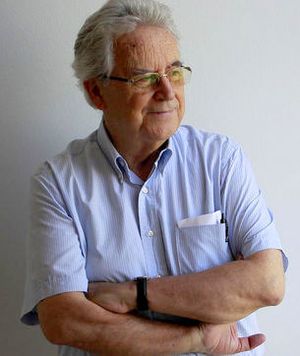Santos Juliá facts for kids
Quick facts for kids
Santos Juliá
|
|
|---|---|
 |
|
| Born | 16 September 1940 |
| Died | 23 October 2019 (aged 79) |
| Alma mater | Complutense University of Madrid |
| Occupation | Professor (Historian, Sociologist) |
| Employer | National University of Distance Education (UNED) |
| Awards |
|
Santos Juliá Díaz (born September 16, 1940 – died October 23, 2019) was an important Spanish historian and sociologist. He spent his life studying and writing about the history of Spain, especially the 20th century.
About Santos Juliá
Santos Juliá was born in Ferrol, Spain, in 1940. He spent his early years in Vigo and Seville. In Seville, he studied at a school called Instituto San Isidoro. He first studied theology, which is the study of religious beliefs. However, he later decided to study sociology, which is the study of how people live together in groups and societies.
He greatly admired Manuel Azaña, who was a very important political leader in Spain's history.
His Career and Studies
In 1979, Santos Juliá started working at the Universidad Nacional de Educación a Distancia (UNED), which is a university in Spain that offers distance learning. He became a lecturer there. He earned his PhD in Political Science and Sociology from the Complutense University of Madrid. A PhD is the highest university degree you can get.
From 1980, Juliá also wrote articles as a columnist for El País, a major newspaper in Spain. In 1989, he became a full professor at UNED. This meant he was a top expert in Social History and Political Thought. He taught students about how societies have changed over time and how political ideas developed.
Santos Juliá passed away on October 23, 2019, in Majadahonda, near Madrid, when he was 79 years old.
His Books and Writings
Santos Juliá wrote many important books about Spanish history. His works helped people understand key moments in Spain, like the Second Spanish Republic, the Spanish Civil War, and the period when Spain became a democracy again (called the Transition).
Here are some of his well-known books:
- Madrid, 1931–1934. From Popular Festival to Class Struggle (1984)
- Socialists in Spanish Politics (1997)
- Histories of the Two Spains (2004)
- Life and Times of Manuel Azaña (1880-1940) (2008)
- Today is Not Yesterday (2010)
- Praise of History in Time of Memory (2011)
- Transition. History of a Spanish Policy (1937-2017) (2017)
His books are still studied by students and historians today.
See also

- In Spanish: Santos Juliá para niños
 | Audre Lorde |
 | John Berry Meachum |
 | Ferdinand Lee Barnett |

